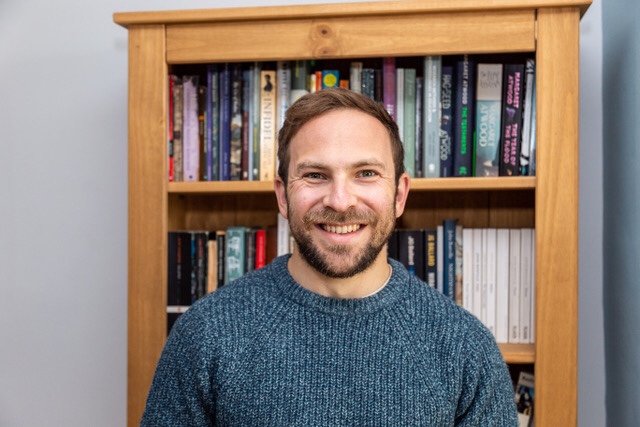Caryl Lewis is an award-winning writer. We knew that in 2005 when she won the overall Welsh-language award at the Wales Book of the Year for Martha, Jac a Sianco (Y Lolfa, 2004), a feat she repeated in 2016 with Y Bwthwyn (Y Lolfa, 2015). And now she can claim to be the first to win the overall award in both languages, too, having won for her first English-language novel, Drift (Penguin, 2022).
Drift is a magical-realist novel in which native Welsh speaker, Nefyn, rescues a drowned prisoner, Hamza, from her (more or less) personal beach. Hamza had been extraordinarily rendered from Syria by the British army. He was being transported to a military hospital when the road he was travelling on collapsed in a storm and he fell into the sea.
It’s possible that Nefyn’s dead mother, Arianell, summoned the storm in order to bring Hamza to Nefyn. Nefyn obliges by bringing Hamza back from the dead.
That’s the kind of magical realism that surprises Drift‘s reader.
Hospitality
Nefyn doesn’t just invite Hamza inside her cottage. She resurrects him in order to do so.
The ethical Law of Hospitality has long been regarded highly. The Law dictates that, should any guest arrive at your door, you should provide them refuge—food, a bed, the chance to wash, for instance—even before asking their name, where they’ve come from, and why they’ve undertaken their journey.
This is the right and proper behaviour for a host.
Of course, this may lead to problems. In Drift, Nefyn’s brother and housemate, Joseph, is put out (literally) by Hamza’s arrival. When Joseph discovers Hamza in the cottage, he finds him wearing his clothes and sleeping in his bed.
The risk of the Law of Hospitality, then, is that the host risks being taken hostage or even turfed out. In fact, the morning after Joseph has slept in the boatshed while Hamza has used his bed, Hamza has already started to feel like the host at home in the cottage:
Outside, Hamza waited. Listened as Joseph moved around inside the cottage, his very presence strangely violating. He saw him emerge, a bag on his back. He didn’t even look in Hamza’s direction.
Caryl Lewis, Drift (London: Penguin, 2022), p. 106
The idea that Joseph’s presence can be ‘strangely violating’ shows how perverse and effective the Law of Hospitality can be. And how it has worked perfectly for Nefyn.
Odyssey redux
But there is something else going on in Drift.
First, the sea witch Nefyn—who lives near Porth-y-Wrach, the Witch’s Gate—has taken Hamza hostage. He belonged to death, but she has recovered him and kept him in life. In that sense, she is both host and hostage-taker.1
Second, in this idea of Nefyn as a sea witch, readers are led to connect Drift to Homer’s epic poem the Odyssey—another book that stages a series of hospitable acts. In that poem, a sea witch called Circe2 takes the hero, Odysseus hostage. This may sound similar to Nefyn and Hamza. However, though Odysseus escapes, it is through the help of the god Hermes and his strength and wisdom—and this doesn’t sound like the Nefyn–Hamza story.
There is another hostage-taking sea goddess in the Odyssey who helps us understand Drift even more. The sea nymph Calypso—daughter of another sea nymph, like Nefyn—keeps Odysseus hostage and her lover.
Calypso eventually sets Odysseus free and assists him in building a boat, just as Nefyn commissions Emrys to help Hamza repair a boat. Also, Calypso gives Odysseus a fair wind as he leaves her island, Ogygia, just as Nefyn summons ‘A squall’ (Lewis: 214) to help Hamza on his way.
Clearly Lewis was inspired by these sea-faring stories from Homer’s epic poem.
Modern nostalgia
Nefyn is far more willing than either Circe or Calypso to set her hostage leave. In this sense, Nefyn’s hospitality extends to her helpful act of finding Hamza a way to go home.
This also taps into the ethic of nostos in the Odyssey. Nostos means ‘homecoming’ in Greek, and is the motivation for all twenty-four books of the poem: Odysseus is trying to find his way back from the Trojan war to Ithaca where he hopes his wife, Penelope, and son, Telemachus, await him.3 Nostos is also Hamza’s motivation.
The modern English word ‘nostalgia’ builds on ‘nostos’, combining it with another Greek word, algiseis, meaning ‘painful’ or ‘grievous’. Where the English means a ‘longing for a past no longer with us’, the Greek combination of words means the ‘pain of going home’. We can see that pain when Nefyn and Hamza argue about whether she can go back to Syria with him (Lewis: 196–7), and also in the way that Nefyn is in pain when she asks her brother to return her to the Cove so she can go home—so the nymph can be swallowed by the sea:
As the water pulled at her, she turned back for a moment, smiled fleetingly, the compass glistening at her neck, before disappearing into the dark.
Lewis: 224
What else should I read?
- Homer’s Odyssey. There are lots of different translations out there, and also a free version available here.
- Zachary Mason’s The Lost Books of the ‘Odyssey’ (Jonathan Cape, 2010) offers forty-four new tales about Odysseus, but with a postmodernist flavour. Well worth the read—especially if you’re looking for more maritime playfulness
- The etymological connections between host and hostage exist in English and other languages, such as Latin. The connections extend to the words for enemy, and host and ghost. ↩︎
- Yes, George R.R. Martin’s villainous Circe Lannister was named after this Ancient Greek villain. ↩︎
- By the time he arrives back at Ithaca, Odysseus has been away for twenty years. Like Drift‘s Hamza, when Odysseus first turns back from Troy he has been absent for a decade. ↩︎

Leave a Reply